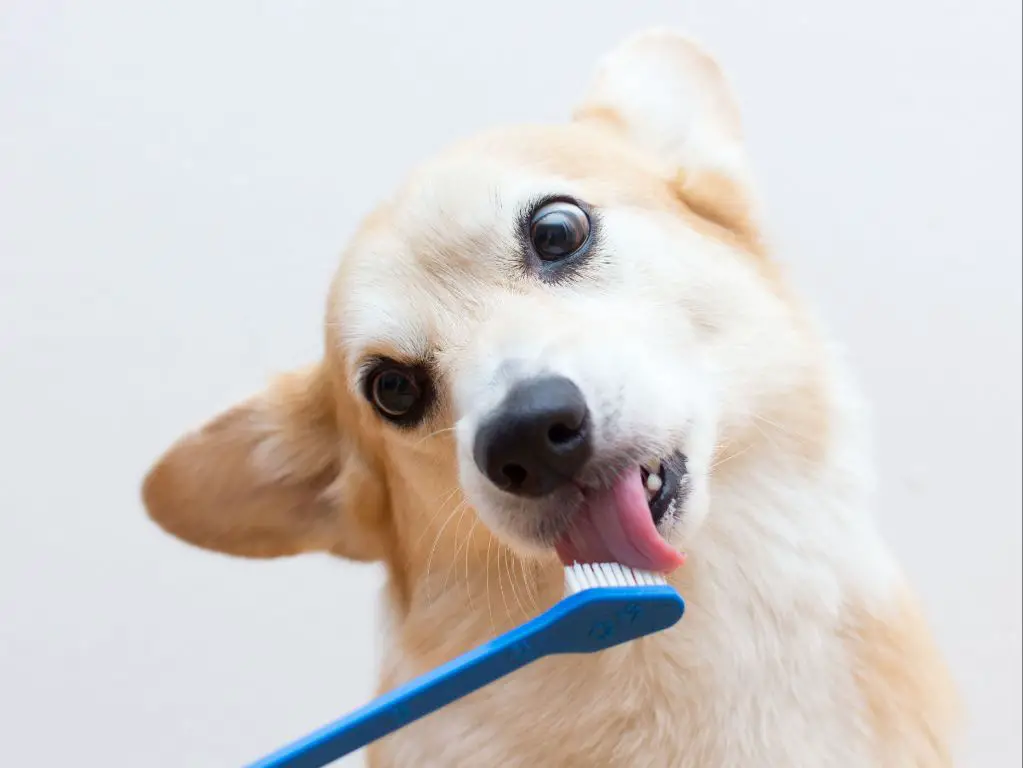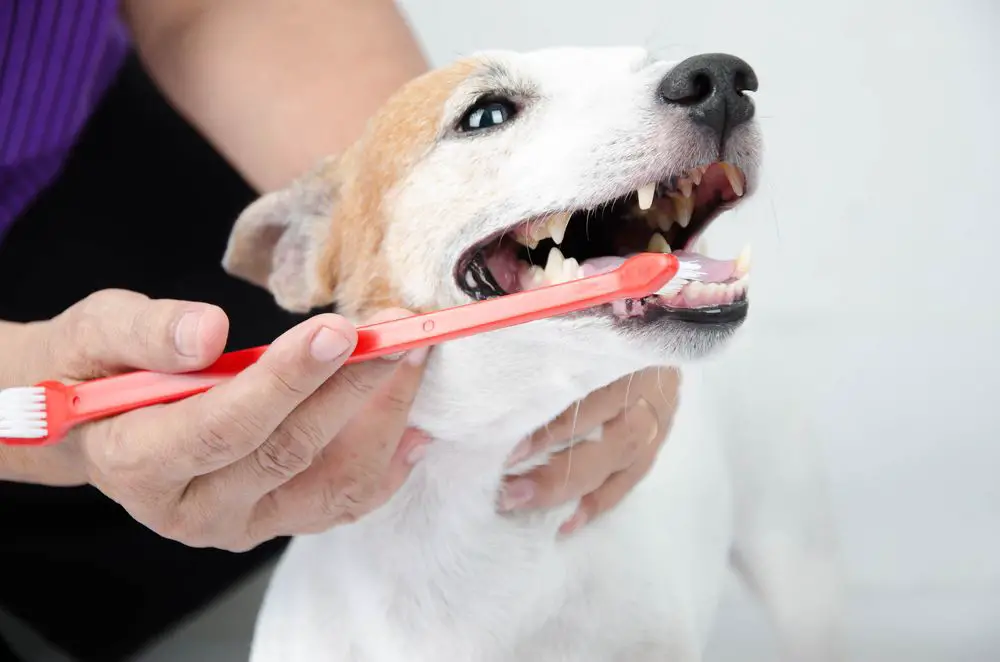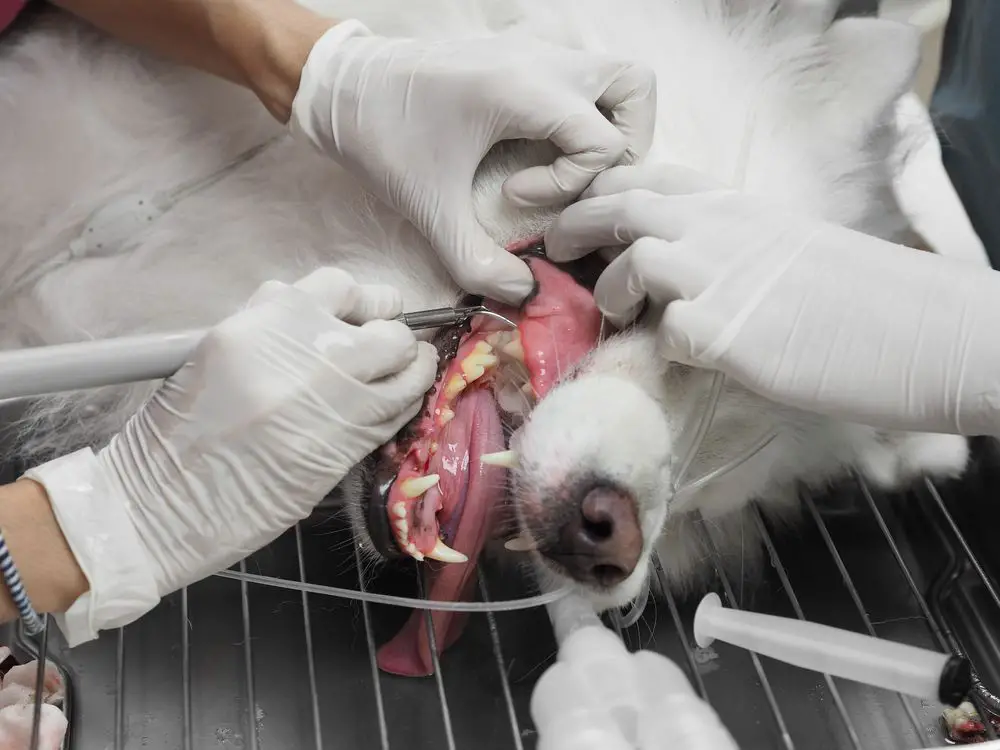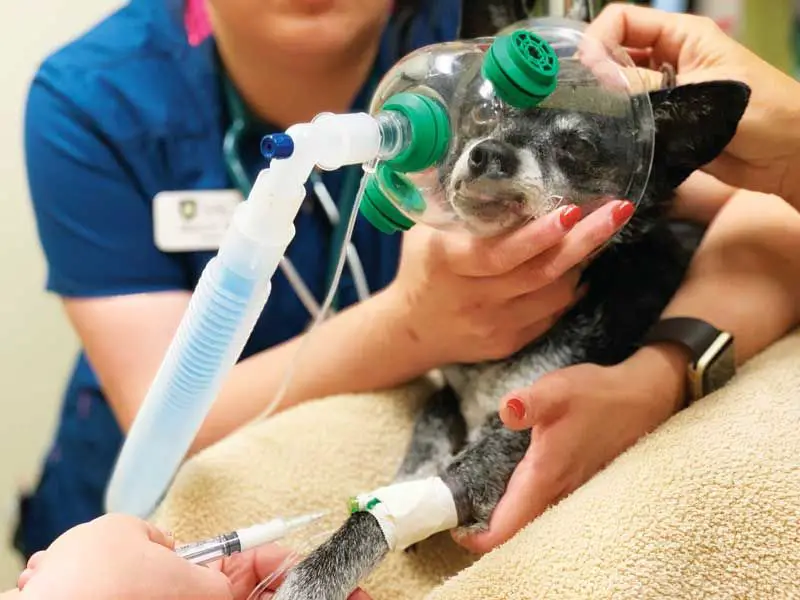Introduction
Non-anesthetic teeth cleaning for dogs refers to dental care procedures that can be performed without putting the dog under anesthesia. These procedures aim to remove plaque and tartar from a dog’s teeth to improve oral health and prevent more serious dental disease.
Non-anesthetic cleanings are less invasive and cheaper than a full veterinary dental cleaning under anesthesia. However, they generally do not clean beneath the gumline where more plaque and tartar accumulates. As such, non-anesthetic cleanings are limited in their effectiveness.
There are various types of non-anesthetic cleanings available including professional vet or groomer cleanings, at-home brushing, dental wipes and gels, dental diets, dental treats, dental chews, and water additives. Costs can range from $10 for at-home products to $100+ for professional cleanings.
This article provides an overview of the different non-anesthetic teeth cleaning options for dogs, typical costs associated with each, and factors that impact the overall cost. It aims to help dog owners understand the benefits and limitations of these procedures compared to anesthetized veterinary dental cleanings.
Benefits of Non-Anesthetic Cleanings
Non-anesthetic cleanings provide several advantages over cleanings done under anesthesia. The main benefits are:
-
Less risk than anesthesia – Anesthesia always carries some risk, albeit small, of complications. Doing cleanings without anesthesia avoids this risk entirely.
-
Less expensive – Non-anesthetic cleanings don’t require the anesthesia fees and related services, making them a more budget-friendly option.
-
Convenience – Owners don’t have to worry about dropping off and picking up their pet from the vet. Non-anesthetic cleanings are often quicker as well.
For pets that are healthy enough, a non-anesthetic cleaning can provide dental care with minimal risk and greater affordability.
Types of Non-Anesthetic Cleanings

There are several types of non-anesthetic cleanings pet owners can do from home to help maintain their dog’s dental health between professional cleanings. Some of the most common include:
Brushings
Daily tooth brushing with pet-safe toothpaste is the most effective at-home dental care. Special pet toothbrushes allow you to brush all surfaces of the teeth. It takes time for dogs to get used to brushing but it’s worth the effort.
Dental Sprays
Dental sprays contain antibacterial ingredients to freshen breath and reduce plaque and tartar buildup when sprayed on the teeth and gums. They are quick and easy to use but do not remove existing plaque.
Dental Wipes
Dental wipes are infused with cleaning solution to wipe away soft tartar when rubbed on the teeth. They help keep the teeth cleaner between brushings but do not replace daily brushing.
Dental Gels
Dental gels contain enzymes that break down plaque. You rub the gel on the teeth and gums, allowing time for the enzymes to work before wiping away plaque. Dental gels help reduce plaque between thorough cleanings.
Dental Chews
Oral care chews use abrasives and anti-plaque ingredients to scrape away tartar and plaque as the dog chews. They help clean hard-to-reach back teeth. Look for VOHC-approved dental chews.
Cost by Type of Non-Anesthetic Cleaning
The cost of non-anesthetic cleanings can vary significantly depending on the specific type of cleaning you choose. Here’s a breakdown of average costs:

Professional Dental Cleanings
Getting your dog’s teeth professionally cleaned by a veterinarian typically costs $100-$300. Many vet clinics offer dental package deals that include the cleaning along with a dental exam, pre-anesthetic bloodwork, and antibiotics for around $300-$500.
DIY Brushing
Brushing your dog’s teeth at home is the most affordable option but requires daily effort. The upfront costs include:
- Dog toothbrush – $5-$15
- Dog toothpaste – $10-$20
Replacement brush heads and toothpaste will be an ongoing cost of a few dollars per month.
Dental Wipes and Gels
Dental wipes and gels offer a quicker alternative to brushing. Expect to pay:
- Dental wipes – $15-$25 for a pack of 30
- Dental gels – $10-$20 per tube
These will need to be reordered every 1-2 months.
Dental Chews
Veterinary dental chews range from $15-$35 for a pack of 30 chews depending on size. These can be given as daily treats.
Water Additives
Water additives cost around $15-$25 per bottle and typically last 1-2 months.
Factors That Affect Cost of Non-Anesthetic Cleanings
The price for non-anesthetic dental cleanings can vary depending on several factors, with the main considerations being the dog’s size, age, dental health, and frequency of cleanings needed.
Size: Smaller dogs generally have lower cleaning costs than larger breeds. This is because smaller mouths require less time, effort and dental care products.
Age: Senior dogs or dogs with medical conditions may require more involved cleanings, special care, and additional dental services. This can increase the cost compared to younger, healthy dogs.
Dental Health: Dogs with significant tartar buildup, gum disease or other dental issues often need more time for the cleaning and additional services. The worse the teeth and gum health, the higher the cleaning is likely to cost.
Frequency: Dogs that get non-anesthetic cleanings more often as part of their regular oral care routine will have lower costs for each visit compared to dogs getting a cleaning for the first time or after a longer period of neglect.
Professional Non-Anesthetic Cleanings
Professional non-anesthetic cleanings are performed by a veterinarian or certified veterinary hygienist. They typically range from $100-$150 per dog, depending on your geographical location and the veterinarian’s fees.

Mobile vet services are a convenient and affordable way to get a professional dental cleaning without anesthesia. Mobile vets come to your home to provide teeth cleaning and other services. Costs for mobile non-anesthetic cleanings are similar, around $100-$150 per dog.
Key advantages of professional cleanings include:
- Thorough cleaning above and below the gumline
- Polishing to smooth enamel
- Fluoride treatment to strengthen enamel
- Examination for signs of oral disease
- Removal of plaque and tartar buildup
However, anesthesia is required for a full dental exam, x-rays, and invasive procedures like extractions. Non-anesthetic cleanings are limited in what they can diagnose and treat.
Professional cleanings require specialized equipment and training to properly clean a dog’s teeth. DIY brushed can’t fully replace a vet cleaning. But regular non-anesthetic cleanings paired with daily brushing offer an effective preventative dental care routine for dogs.
Other Preventative Dental Care
In addition to regular teeth cleanings, there are other steps dog owners can take to maintain their pet’s dental health between professional cleanings including:
Toys
Giving your dog dental chew toys can help scrape away tartar and plaque. Look for tough rubber toys, nylon bones, ropes or other toys designed specifically for dog teeth cleaning. Avoid toys made with softened vinyl or plastic, which dogs can easily bite pieces off of. Supervise your dog with any toy to prevent choking hazards.
Treats
Dental treats for dogs can also promote better oral health. Look for treats made with crunchy textures, nubbly surfaces or ridges that help scrape plaque as the dog chews. Some treats contain ingredients like zinc chloride or sodium tripolyphosphate that help prevent tartar. Ask your vet for recommended dental treat brands.
Diet
Your dog’s regular diet also plays a role in dental health. Dry kibble helps scrape plaque off teeth better than wet food. Some prescription dental diets are formulated to reduce plaque and tartar. Discuss diet options with your vet if your dog has significant dental issues.
With the right toys, treats and diet, you can help maintain your dog’s dental health between professional cleanings.
When Anesthesia May Be Needed
While non-anesthetic cleanings can be sufficient for many dogs, anesthesia may be recommended if your dog is showing signs of advanced dental disease. Indications your dog’s dental health requires anesthesia include:

- Extensive tartar and calculus buildup
- Gum inflammation or infection
- Loose or missing teeth
- Ulcers or growths in the mouth
- Fractured or damaged teeth
Your vet may also recommend an anesthetized cleaning if your dog has a history of not tolerating non-anesthetic cleanings. The anesthesia allows the vet to do a deep scaling and polishing to fully remove calculus above and below the gumline and check the mouth thoroughly for issues. Though anesthesia comes with risks, it can be safer for dogs with extensive dental disease. Consult your vet to determine if an anesthetized cleaning is right for your dog. They will make a professional recommendation based on your dog’s unique dental health and needs.
Aftercare & Maintenance
After a non-anesthetic dental cleaning for your dog, it’s important to continue a dental care routine at home. This involves both using products that support your dog’s oral health as well as scheduling regular veterinary dental checkups.
Keep using dental chews, gels, wipes, toothpaste, water additives, or any other products recommended by your veterinarian. Using these items daily removes soft plaque buildup and freshens breath. They also help prevent tartar formation between professional cleanings.
Set reminders to brush your dog’s teeth multiple times per week, if they will tolerate it. Special dog toothbrushes and toothpastes are available. Never use human toothpaste, which can upset your dog’s stomach.
Schedule exams with your vet every 6-12 months to monitor your dog’s oral health. The veterinarian will check for signs of periodontal disease and examine any problem areas in the mouth. Professional cleanings may be recommended, usually once a year.
Keeping up with home dental care and regular veterinary visits helps maintain the benefits of the original non-anesthetic cleaning. It keeps plaque and tartar at bay, avoiding the need for intensive dental work under anesthesia in the future.
Conclusion
With an option for multiple types of non-anesthetic teeth cleaning services, pet owners have flexibility for regular dental care without anesthesia. Professional teeth cleaning remains the most thorough yet priciest approach, costing $100-300 depending on veterinarian pricing and location. Home maintenance options like brushing, dental chews, and oral rinses are the most affordable at under $100 annually. Water additives offer minimal cleansing for $15-30 per bottle. Ultimately, the ideal non-anesthetic solution depends on your dog’s dental health needs and your budget. Regularly using a combination of professional cleanings and daily home care provides the best preventative dental care.